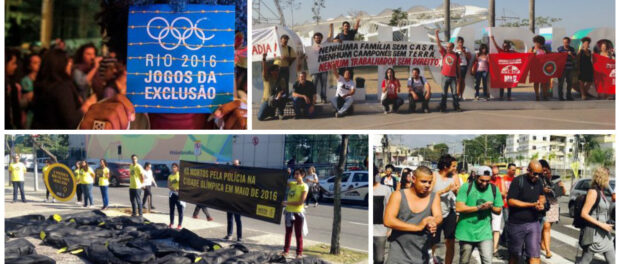
The month before the 2016 Olympic Games has been the busiest media month for Rio and Rio’s favelas yet. To help our readers digest the major news and themes of July, we’ve summarized the stories we published here on RioOnWatch along with a few other must-reads in the media on favelas. Access past monthly summaries here and full digests here.
This final week before the Rio 2016 Olympics begin is packed with planned protests against the “Exclusion Games.” It will be the culmination of a month of demonstrations, including the fishermen’s protest at the government’s failure to clean Guanabara Bay.
Rio’s mayor still insists the Games will leave a positive legacy for all but geographical analysis proves investments have been concentrated in wealthier areas. Transportation construction has left trails of destruction in lower income areas like Ramos, while the legacy project to create bike lanes in Maré remains incomplete. Maré journalist Walmyr Junior writes that the “State of Public Calamity” declaration gave the governor the right to cut public services, but this “right to ‘cut’ has always been the political practice in the favelas.”
Constant police operations are disrupting the daily lives of Maré’s residents, spurring activists to campaign to inform community members of their rights and discuss the impacts of these “public (in)security” policies. Alemão activists protested violence with a fake Olympic torch, while a recent Amnesty International protest highlighted that May 2016 saw more than a 130% increase in homicides by police compared to May 2015. All these protests question for whom Olympic security is intended.
A historic exchange between US Black Lives Matter activists and black Brazilian activists saw discussions of both the trauma and the resilience in black communities. In both Brazil and the US, the trend is for black men to be killed while women fight against police violence. One cannot understand violence in Rio without looking at the city’s long history of institutionalized discrimination against those who are poor and black—our feature on the criminalization of poverty in Brazil is a must-read.
Vila Autódromo and supporters across the city celebrated a long-awaited victory last week as the remaining 20 families received the keys to their new homes in the community. Of course, as the documentary The Fighter shows, not all families who wanted to stay could remain. Some of those displaced now face unexpected debts in public housing after the City seemingly broke yet another agreement.
Struggles against displacement continue in Paraty, where a fishing community resists real estate speculation, and in Manguinhos, where over 1,000 families were evicted but little has been built in their place. In the Port, some positive news: the Vito Giannotti occupation won the legal right to remain.
On RioOnWatch this month we ran a three-part series on the Camorim Quilombo, examining its history dating back to slavery and its ecotourism projects before breaking the disturbing news that the Olympics Media Village was built where Camorim residents believe their ancestors are buried.
This controversy was picked up by The Guardian, which also published the latest instalment of reflections from community journalists Daiene Mendes, Thaís Cavalcante, and Michel Silva. Thaís and Michel were also featured in a superb episode of WNYC’s ‘On the Media,’ along with CatComm director Theresa Williamson on some of the challenges of reporting on favelas.
Long after the Olympics wrap up, it’ll be local projects that aim to pick up the pieces, creating virtuous cycles of development, like those in Turano and Salgueiro, that will leave true positive legacies for favelas. Lasting change will emerge from community-based groups like Instituto Raízes em Movimento promoting the consolidation of local knowledge through innovative university-community collaborations; an innovative education project in César Maia; collective action to revitalize public space in Vila Laboriaux; and from women’s empowerment projects like funk that breaks boundaries or inspiring dance classes in Rio das Pedras. While some communities like Horto are looking to their history to legitimize their rights to their land, civil society is already looking beyond the Games to envision a better future.
Journalists should take note of our pre-Olympic best and worst reporting analysis, as well as the updated Olympics Resources for Journalists, now with contact information and mapped locations for over 50 favela leaders.
Look out for our next summary of articles from August, with the Rio 2016 Olympics finally underway. For more information and links to favela news from the month, see our full Favela Digest for July 2016 here. You can subscribe to receive the Favela Digest straight to your inbox each month here.
